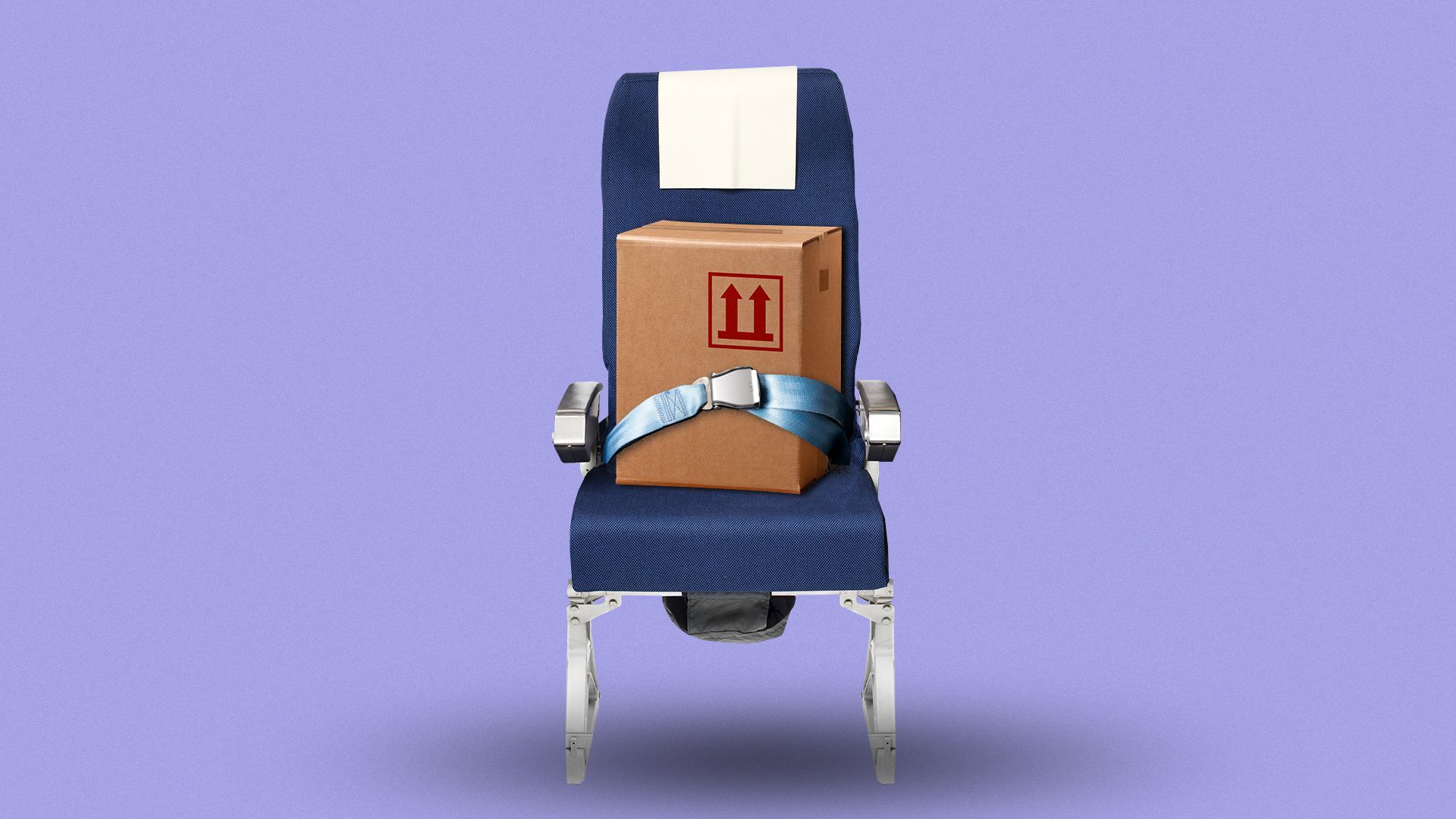Airlines pivot to cargo during pandemic
Add Axios as your preferred source to
see more of our stories on Google.

Illustration: Annelise Capossela/Axios
Passenger airlines devastated by the decline in air travel during the pandemic are making up some of their lost revenue by strapping cargo into passenger seats and overhead bins of planes that would otherwise be grounded.
The big picture: It could be several years before passenger air traffic returns to normal, but the global demand for medical supplies, along with disruptions in manufacturing supply chains and increased e-commerce, means airlines have a chance, at least temporarily, to offset some of those losses by transporting more freight.
What's happening: Since the pandemic began, some 150 airlines have been operating cargo-only "ghost flights," using passenger jets to transport freight, according to Logistics Management magazine.
- Icelandair Group, for example, in a deal with logistics provider DB Schenker, removed the passenger seats from three B-767 aircraft to transport medical equipment from China to Europe and the U.S., even slapping Schenker's name on the side of its planes.
- Emirates SkyCargo began loading cargo in the overhead bins and seats of its B777-300ER passenger aircraft in early May in response to growing customer demand.
- Other airlines, including KLM, SWISS, Qantas, Air Canada and Cathay Pacific, have also modified some passenger aircraft to transport cargo.
- Lufthansa even has a name for the converted planes: "preighters," per Logistics Management.
“The cargo business is keeping aircraft, which would otherwise be parked, in the air and given us all more hope ... that we will come out of this.”— Dominic Kennedy, Virgin Atlantic’s head of cargo operations, told Logistics Management
Zoom in: United Airlines said cargo revenue was a bright spot in an otherwise dismal second quarter.
- Total revenue plunged 87% in April, May and June, but cargo revenue was up 36% as United flew 3,800 international cargo-only flights during the period.
- "I mean, who would have ever thought we could do something like that?" CEO Scott Kirby said on an investor call, praising employees' resiliency.
Background: Passenger airlines have always carried commercial cargo — along with luggage and occasional pets — inside the belly holds of their planes. But when passenger traffic collapsed in early March, that airfreight capacity disappeared.
- Yet as the virus was spreading, demand soared for personal protective equipment like masks, gloves and gowns, most of which is made in China.
- Travel restrictions also snarled international shipping, stranding cargo containers in ports worldwide.
- And as people hunkered down, they did more online shopping, boosting demand for fast goods delivery.
- "What COVID-19 caused was a huge backlog of shipments because the world stood still for awhile," Aditi Mehta, whose company, PROS, provides revenue management tools for airlines, tells Axios.
For the record: The Federal Aviation Administration in April approved the use of overhead bins, storage closets and under-seat areas in the passenger portion of aircraft for lightweight pieces on cargo-only flights.
- In May it expanded the rule to allow airlines to place cargo — with restrictions — in passenger seats when no passengers are on board.
What to watch: The cargo business is notoriously erratic — even more so now — and the head of the International Air Transport Association warned in a statement this week of continued turbulence ahead.
- The rush to get personal protective equipment (PPE) has subsided and the economic recovery remains slow.
- “Cargo is, by far, healthier than the passenger markets but doing business remains exceptionally challenging," said Alexandre de Juniac, IATA's Director General and CEO.
